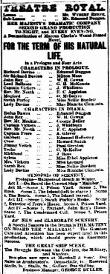 6258624112658784545.jpg
6258624112658784545.jpg
 6258624112658784545.jpg
6258624112658784545.jpg
An adaptation of Marcus Clarke's novel, written by Edmund Duggan, who also took the role of Rufus Dawes.
A contemporary review notes that:
The drama is necessarily constructed with an eye to startling effects and powerful situations, and ample scope is found for these in the brutalities and barbarisms which characterised the convict system with which the early pages of Australian history are besmirched. Thus the mutiny on board the convict ship Malabar is given due prominence; the scenes in the prison yard where 'man's inhumanity to man' was so frequently witnessed are appropriately emphasised, and the various details of attempted escapes and inevitable captures are realistically presented. These are legitimate uses of the story for dramatic purposes, but the scene between the cannibal Gabbett and his two comrades is unnecessarily repulsive, and touches that border-line where attempted realism only provokes laughter, the subsequent view of the man-eating convict chasing a comic parson with an axe being neither convincing nor edifying. The final act gets away from tho book altogether, but this is probably only to be expected, for the patrons of melodrama would scarcely rest content without the good old-fashioned tableau of virtue triumphant and villany [sic] vanquished, and so on this interesting picture the curtain falls.
Source:
'Theatre Royal', Chronicle, 11 December 1897, p.34.
Performed by Her Majesty's Dramatic Company at the Theatre Royal, Adelaide, from 6 December 1897.
Cast:
Edmund Duggan (Richard Devine / Rufus Dawes), Milton Moss (Sir Richard Devine), W.H. Cowan (John Rex), G.H. McKenzie (Lord Bellasea), J. Whidburn (Captain Vickers), F.C. Appleton (Rev. Mr North), G. McIntyre (Mogford), Nellie Burdett (Sarah Purefoy), Blanche Clements (Lady Devine), George Buller (Rev. Mr Meekin), A. Glover (Captain Frere), Edmund Holloway (Gabbett), Howard Smith (Crow), Paul Greyton (Jimmy Veitch), G. McKellar (Troke), J. Ross (Kirkland), Ethel Appleton (Sylvia), Miss Leonard (Mrs Vickers) (see advertisement).